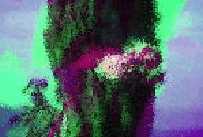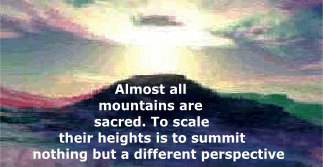![]() This
morning I clearly see the mountain usually obscured by the
idea of the monstrous—the refusal to remain wedded to an image
of the human as final and all-encompassing description---is an affirmation
of the possibility of the new, of our no longer being clouds
or pollutants, as my "glacial eye" closes the distance
between us.
This
morning I clearly see the mountain usually obscured by the
idea of the monstrous—the refusal to remain wedded to an image
of the human as final and all-encompassing description---is an affirmation
of the possibility of the new, of our no longer being clouds
or pollutants, as my "glacial eye" closes the distance
between us.
| Thoreau
had said of the mountain tops that ‘only daring and insolent
men, perchance, go there. Simpler races, as savages, do not
climb mountains—their tops are sacred and mysterious tracts
never visited by them.’ But Thoreau was wrong. |
|
on what you already know.
So, Thoreau |
![]() I
trip on a string of words. Hitting my head, I remember Allen Ginsberg
always had a notepad and a hedgerow of pens in his shirt pocket.
He didn't want to miss—Language,
language / Ezra Pound the Chinese Written Character for truth
/ defined as man standing by his word—a potential poem. Language!
language! poetry written in the shadow of a tree.
I
trip on a string of words. Hitting my head, I remember Allen Ginsberg
always had a notepad and a hedgerow of pens in his shirt pocket.
He didn't want to miss—Language,
language / Ezra Pound the Chinese Written Character for truth
/ defined as man standing by his word—a potential poem. Language!
language! poetry written in the shadow of a tree.
![]() If
we must give everything a name, I wish we would cyclically rename
the flowers, grasses, trees, birds in flight, animals and stones,
beings
and non-beings,
particles,
and planets too. With each round, whatever
the means—sacred bones,
rattles, bells or voices—it is almost as if man is trying to catch
the ear of God, to make God listen. But it is the two most proselytistic
religions, Christianity and Islam, that have shown the greatest desire
to increase the sound output of their acoustic signals, enforcing
the idea that a new
mythology would spring up; and old beliefs, with their worn-out words
for the Unnamable, would be preserved on a disk, primarily for
the interest of scholars of Comparative Religion.
If
we must give everything a name, I wish we would cyclically rename
the flowers, grasses, trees, birds in flight, animals and stones,
beings
and non-beings,
particles,
and planets too. With each round, whatever
the means—sacred bones,
rattles, bells or voices—it is almost as if man is trying to catch
the ear of God, to make God listen. But it is the two most proselytistic
religions, Christianity and Islam, that have shown the greatest desire
to increase the sound output of their acoustic signals, enforcing
the idea that a new
mythology would spring up; and old beliefs, with their worn-out words
for the Unnamable, would be preserved on a disk, primarily for
the interest of scholars of Comparative Religion.
Mountains and buildings would be treated with the same respect. "What's the address of that mountain again?" "Does that building have an elevator, or crumbling Mayan steps?"
|
"Here, as at Machu Picchu there is the awareness of a link between civilizations, a link that is fundamentally human, and it is the awareness that comets, largely made of ice, 'carry bacterial life across galaxies and protect it from radiation damage along the way...It is now universally accepted that space contains the "ingredients" of life. This development could be the first hint of a huge paradigm shift. But mainstream science has not accepted the hard core of modern panspermia, that whether we are dealing with Tikal or our world, we are confronted with the sense of 'a continuing present,' something which does not depend on units of time, or measurement of any sort, to be realized."
![]() "Coming
back on the public bus, I noticed Moose signs in residential
areas. Moose crossings in the city? I guess so. They do roam
in areas along the coastal trail where we were going to bike.
But in the city????"
"Coming
back on the public bus, I noticed Moose signs in residential
areas. Moose crossings in the city? I guess so. They do roam
in areas along the coastal trail where we were going to bike.
But in the city????"
| What is a city? A paved-over forest still peeking through the cracks. |

Blue
plums splatter the street today, Along with
the future, Eureka! In front
of the Quonset hut |
![]() Even
as a child I saw the elderly as more important to the future of the
species than the children, as each child must learn what adults
already know. Biologically, environmental
problems are very pressing and all environmental professionals
ought to at least be able to make some kind of contribution to solutions
now. It took centuries of argument to come to the conclusion that children
are the future, but only if adults give them one.
Even
as a child I saw the elderly as more important to the future of the
species than the children, as each child must learn what adults
already know. Biologically, environmental
problems are very pressing and all environmental professionals
ought to at least be able to make some kind of contribution to solutions
now. It took centuries of argument to come to the conclusion that children
are the future, but only if adults give them one.
| When
the moon rocket went to the moon and some of the young
kids were trying to tell the old people about this, they were
getting really frustrated because the old people were saying, "Oh,
that's nothing, my uncle went to the moon lots of times." |
There is a female presence standing next to me who i sense is a ghost-hunter. In front of us is a doorway in which ripples a curtain of colored lights. She runs to the lights and wrestles them to the floor of a room beyond the doorway. i am where she and the lights were a moment ago. A man is standing nearby, looking down at me. He is slim and has a mock-friendly smile on his face, and small hat worn at an insolent angle.
I awake shivering as if I'd been in the presence of Death, recognized only by the uncanniness of its disguise. It's what peeks through the familiar facade that frightens me. This time, it was the angle of the hat that tipped me off.
![]() One
reaches the point where everything is experienced just as it is.
Of course there is still creativity, which means taking one's self
seriously.
One
reaches the point where everything is experienced just as it is.
Of course there is still creativity, which means taking one's self
seriously.
![]() One
more time—the museums, old friends. But the past is a meal
already digested. The poem I long for, the voice, the rhythm of a
foreign sound—a singular gift that doesn't return.
One
more time—the museums, old friends. But the past is a meal
already digested. The poem I long for, the voice, the rhythm of a
foreign sound—a singular gift that doesn't return.
Resurrection doesn't conquering death,
but carrying death forth like a torch,
lighting every thing with its shadow.Nobody gets
to be a cow-
boy forever.
|
Mushrooms grow on trees
as if they belong. Hairy moss, |
 |
(Michel) Serres argues that the term "parasite" has three meanings. Firstly, in French (and in Greek too) the parasite is someone who eats at the table of another without being invited. Secondly, if one draws the term from parasitology, the parasite can be a microbe, a single cell organism or even an insect that feeds on a host. Finally, the third meaning has to do with the notion of Sacred Noise passed into the hands of new custodians. Then it was the turn of factory owners to establish their social authority by deafening society. It is only after the diminution of its power as a social force that the Sacred Noise becomes static on the line; that is, noise within communication.
![]() Waiting
for a bus, leaves swept to the curbside, trees standing like sentinels
to either side of the wooden bench. People drive as if locked in
sarcophagi remind me of the Navajo who was buried in his pickup
truck. "He loved that truck," his wife solemnly said.
Waiting
for a bus, leaves swept to the curbside, trees standing like sentinels
to either side of the wooden bench. People drive as if locked in
sarcophagi remind me of the Navajo who was buried in his pickup
truck. "He loved that truck," his wife solemnly said.
Keeping my breath close to me, I climb the mossy sleeves of stone steps, either side tangled with vines. Religious people climb similar steps on knees bleeding from faith in ambivalent events. Here, vagrant newsprint stretches out with drained bottles of wine, with acorns looking for a place to nest.
By the Stone House:

I think: Too bad dogs can't read signs! "That's what we got humans for," a gravely voice growls from beneath a heap of blankets in a dark corner. I think: For someone out of place, you're perfectly placed.
![]() Why
have I stopped by lengths of pavement whose veins meander like the
walls of Paleolithic caves? How many civilizations have risen to
disappear? More blue plums fallen and smashed today against flat
blue-gray stones. Thinking
we're different spawns the illusion of an ultimate purpose.
Why
have I stopped by lengths of pavement whose veins meander like the
walls of Paleolithic caves? How many civilizations have risen to
disappear? More blue plums fallen and smashed today against flat
blue-gray stones. Thinking
we're different spawns the illusion of an ultimate purpose.
A friend tells me he plans to cut down the
unruly tree in his front yard and plant one
that is better behaved.
![]() Autumn's
first day, the air crisp as a rifle's retort. Walking into the kitchen
this morning I suddenly realized that I was walking into
the kitchen!
Autumn's
first day, the air crisp as a rifle's retort. Walking into the kitchen
this morning I suddenly realized that I was walking into
the kitchen!
![]() Jungian
analyst and ex-Episcopal priest, Pittman McGehee: "If for a
moment I believed in an anthropomorphic God, which I don't, and I
died and went to Heaven, God would greet me at the entrance and say: Pittman,
you missed the point!"
Jungian
analyst and ex-Episcopal priest, Pittman McGehee: "If for a
moment I believed in an anthropomorphic God, which I don't, and I
died and went to Heaven, God would greet me at the entrance and say: Pittman,
you missed the point!"
![]() Each
moment we recreate the illusion of a self again, so quickly we don't
notice. I write who I am into being.
Each
moment we recreate the illusion of a self again, so quickly we don't
notice. I write who I am into being.
I am beginning to see
that where I am is where
I am not able to be.I am seated in a large audience. My name is called. I walk to the stage, shaking hands along the way. At the podium, looking into a mass of blurry faces, I say: "A minute ago I was one of you. Now I'm up here, facing you. In a few minutes, I will take my seat again. But even when one of us steps forth, we are still a part of each other."
Leaves
are first
What would a tree say?
I am not a tree,
to redden,
first to be
cast away
but I am rooted
to this fault.

